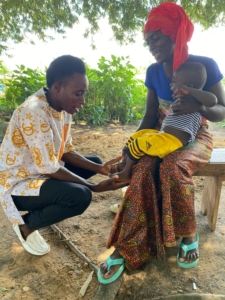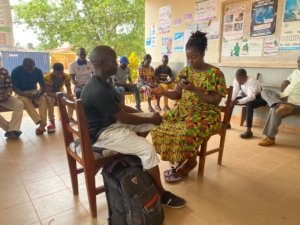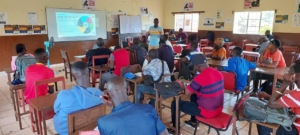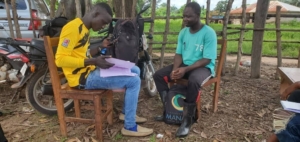In May 2024, Last Mile Health launched district-level operations in Kambia, a “learning lab” where we will pilot new tools and approaches to strengthen community health worker performance and management prior to their national scale-up. Work at the district level will demonstrate how targeted improvements to the national community health program can lead to higher quality health service delivery for all communities in the district.
In Sierra Leone, Last Mile Health partners with the Ministry of Health, using data to improve the quality of the community health worker program at the national and district level and to ensure the program can bring quality care to patients in rural and remote communities. We accompany the government to do this work in three ways: building tools for data review and governance at national level; using those tools to identify gaps in program design and designing interventions to address them; and implementing those quality improvement interventions in learning lab districts. In turn, learning lab district findings inform national scale-up. Together, our work addresses the gaps that occur when taking policy into practice, and ensures interventions are data-driven, sustainable, and practical.
Last Mile Health identified Kambia as its first learning lab district and launched a district office in Kambia under the management of a new district coordinator. Already, a key project was underway in the district: piloting an integrated community health worker supervision tool to boost community health worker performance and support effective data collection and use.
Piloting a new supervision tool in Kambia District
Like any workforce, community health workers need regular supervision to perform at their best and provide quality patient care. “Supervision reminds the community health worker to work effectively,” says Amadu Kamara, a community health worker and peer supervisor in Kambia District. “It will help them be confident about their work and increase performance.”
Until 2024, Sierra Leone’s community health worker program lacked a standardized checklist for supervisors to use when meeting with community health workers—as well as a means of reporting performance data to the Ministry of Health. Without a measurement tool, supervisors face limitations in identifying performance gaps and working to address them through mentorship and training. At the district and national level, a lack of data means Ministry staff are unable to understand if community health workers are effectively delivering primary health services.
To address this gap, Last Mile Health partnered with the Ministry of Health to develop and pilot a new supervision tool. The tool guides supervisors through a checklist developed from each module in the community health worker training curriculum so that supervisors can measure how well each community health worker is performing his or her work. The tool highlights areas where a community health worker is not meeting expectations, and equips the supervisor to review those topics during supervision visits to improve skills. In addition, the tool stores data the Ministry can leverage to develop a deeper understanding of the effectiveness of the national program.
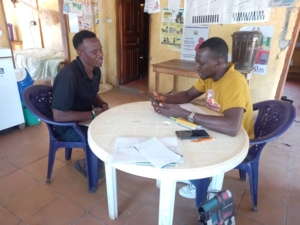
Using the new supervision tool on his mobile device, a supervisor mentors a community health worker.
In April 2024, Last Mile Health launched a full pilot of the supervision tool in Kambia District, working with the Ministry to train and evaluate 35 supervisors, 70 primary health unit staff, 19 district- and national-level Ministry staff. Once trained, the supervisors then used the tool in their ongoing work with all active community health workers in the district.
“Supervision helps to assess the performance of community health workers—are they working the right way?” explains Alimamy Conteh, the nurse-in-charge at Konta Community Health Post in Kambia District. “The new tool helps the supervisor to give on-the-job training to community health workers. It will help the supervisor to provide better support because it gives them the opportunity to ask questions in all areas of the work and helps them to see where a community health worker needs to improve in his or her work.” At the facility level, Alimamy says, “I use the information given to me by the supervisor as an action plan. I can use it to make decisions. The tool connects the community with the health facility, improving the referral system and ensuring continuous care for patients.”
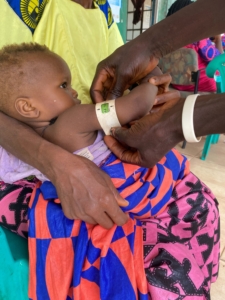
A community health worker screens a young patient for malnutrition using the middle-upper-arm circumference measurement.
Abu Bakarr Bangura, a community health officer on the Kambia District Health Management Team, emphasizes the impact effective and standardized supervision will have for community health workers—and their patients. “Strong supervision will improve on the healthcare system at community level. It will help community health workers to do early identification of diseases and referral of cases,” he says. “The supervision tool provided valuable insights into the performance of community health workers at the community level. It enabled us to identify systemic issues and implement targeted interventions (mentorship and coaching) to improve overall community health worker performance. Information from the tool will guide us on where to start for refresher training.”
Building on feedback gathered during the pilot, the Last Mile Health team will develop supervision process guidelines and revise the tool in collaboration with the Ministry of Health. The team will share the results of the pilot, and the revised version of the tool will be scaled to all districts in Sierra Leone. Informed by the work conducted in the Kambia District learning lab, the national program will be able to move forward with stronger supervision based on data and user feedback from practical implementation.
The pilot of the new supervision tool represents a significant step along Last Mile Health and the Ministry of Health’s journey to strengthen Sierra Leone’s community health program via data-driven interventions that improve community health worker performance to support quality patient care and better health outcomes.And this is only the beginning for the Kambia learning lab: over the next year, the team will also also roll-out tools and approaches focused on data review and management. Using a feedback loop, district-level operations offer an exciting and data-driven approach to strengthening the National Community Health Worker Program and bringing quality primary care within reach for all people in Sierra Leone.

